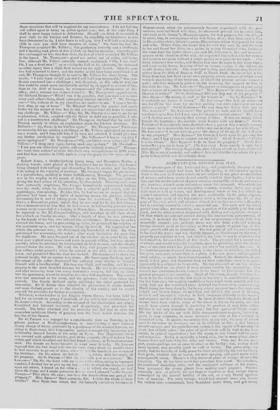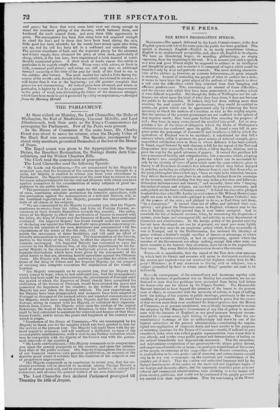AGRICULTCRAL REPORT FOR JULY.
The greater part of the backward hay, mid particularly the crop of the water-meadows which had been fed in the spring, is irretrievably spew. Such is the case in districts which are not subject to any great arcinwilatiou of waters, and whose rivers do not usually overflew their banks ; but in the fees and the neighbourhood of great streams, susceptible of hasty fuel exec-- sive increase, a much more calamitous scene has occurred. Overwhelmine floods have swept over the surrounding country, covering fields and crops with mud as well as water, and floating away much of the hay which re- mained uncarried, end iMuring the grass eventually, by its gritty deposie We may now speak of the hay-harvest as of a season gone by, for of that part of the crop which still remelt's abroad. it is useless to waste a thouele ; and it certainly cannot be called a successful enc. The early and the latter period were alike, unfortunately, wet, a portion of the middle part fine and good, and the other portion chequered with flitting and capricious showers. Of that which was cut and carried during this intermediate periud—and, of course, it included the largest part of the crop—comparatively little materially injured ; yet, perhaps, there was also little collected at ithou;. having received more or less rain ; so that the stipply of prime hay of it . year's growth will not be abundant. The low price of salt has caesed much to be used this year ; and hay slightly injured, or discoloured by tile wet, ii properly putt together at last, and selted in the rick, le nearly as grout a -. best unsalted, for most kinds of live stock. The prospect for a see■-■;t, • of clover, one would naturally coaclude, must be promising, with tI'• • :unce of moisture Which has prevailed; yet this is but partially the • ...•. lets been heretofore observed that much of the clover on middling suits failed. 'this year, and., even where there is a plant, it has not grown aid prospeev since cutting, as might have been expected. Indeed, the aftermath. ie • • neral, is less gross mid luxuriant than we have sometimes seen it, in t apparently lese adapted to its growth. Haynie disposed of our hay as her- time permitted us. an object of even greater anxiety has eucceeded. harvest hae commenced—the issue is itthe hands of Providence, lee , present prospect is not cheering. Aluch of the wheat, iii early di,! been fit for the sickle for the last week or ten days; no consider:: tity leis been cut; but reaping would have been much more gee, ]e! ward, had not the continued rains deterred the farmer from
Much injury has been done by the heavy raine ; on good land.: . lodged arid beaten down ; on middling ;Ind inferior the str.Le. twisted, and entangled, causing in both instances difficulty to the re,
and expense and loss to the farmer. In those districts where the floods I storms have been violent, some of the wheat is flat on the earth, and the weeds have grown thromeli it, rendering its produce of very little value. Mildew is pot very prevalent this year ; but that species of blight which fills the husks of the ear with little orange-coloured maggots, instemi o grain, is very common ; in many instances one side of the wheat-ear ie cleared of corm It appears too certain that, at any rate, the crop of a heat must be far below an average; and it; in addition to this, a wet harvest should succeed, and the grain become sprouted, the supply will not only he short, but of little value; the price of good wheat will be high to the con- sumer, in spite of importation ; but the itdury to the fanner will be great and extensive. Barley is generally a heavy crop, but in many places much beaten down and lodged by therains and storms. Oats are, for the mat. part, good—perhaps not so gross in straw as the barley ; but, as they stand more upright, may possibly yield as well or better. The pulse crops :lid good; but the hacking of early pease has been retarded by the wet weather; their pods, whether cut or uncut, are now opening, and great waste must conaoquently ensue. There is a very universal plant of turnips all over the 'kingdom. The fly has been much less prevalent than usual. Nevertheless, the continued drenching rains, and the occasional coldness of the nights, have prevented the young plants from making much progress. Swedes naturally slow of growth, are not large or vigorous in leaf,. except where stiinulated by the natural fertility of the soil, or a very liberal applica- tion of manure. The early turnips, villich had attained some SIZe before the violent rains commenced, have flourished under thorn, and got strong and gross ; but those that were sown later were not strong enough to stand the continual pelting of the showers, which battered them, and hardened the earth around them, and gave them little opportunity to grow. The consequence has been that many have not acquired strength to stand the hoe ; and in those that have been hoed during the rain, little good has been effected ; for the weeds have struck again after being cut up, and the soil has been left in a soddened and unhealthy state. The present abundance of food, and the expected plenty for the autumnal and winter supply, have advanced the price of store stock, particularly of sheep, which, at the late fairs, have experienced a brisk demand at consi- derably augmented prices. A short stock of lambs causes this article in particular to be eagerly sought after. Prime cows with calves, or fresh in Milk, command good prices ; and swine are still very dear, an additional demand occurring at this time of the year for stock of this kind to run in the stubbles after harvest. The meat market has varied a little during the course of the month ; and, though it has not entirely maintained its advance, is still higher than it was at the beginning; yet still graziers complain that prices are not remunerating. All sorts of grain have advanced, and wheat, in particular, is higher by 4 or 5s. a quarter. There is seine little improvement in the price of wool, notwithstanding the failure of the strenuous attempts which have been made to get it protected by a duty on importation.—ilbridged front the Morning Herald.



















 Previous page
Previous page